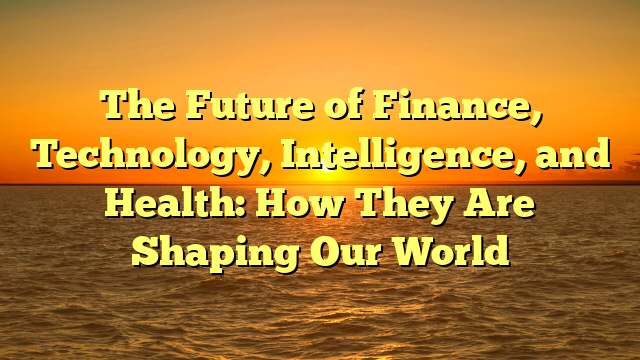In the modern era, the convergence of finance, technology, intelligence, and health is driving profound changes across the globe. Each sector influences the others, fostering innovation and providing solutions to pressing global challenges. This article delves into how these fields are interconnected and how they will evolve in the coming years.
1. The Impact of Finance on Global Development
The financial world has evolved dramatically in recent years. Emerging technologies like blockchain, artificial intelligence, and machine learning are reshaping the financial landscape. These innovations have not only made financial transactions faster and more secure but also introduced entirely new ways to manage wealth, from cryptocurrency investments to robo-advisors. Financial institutions must adapt to these changes to meet the needs of a digital-savvy generation.
As we look ahead, the role of finance in fostering innovation cannot be underestimated. The availability of capital is essential for startups and emerging industries, particularly in tech and healthcare. However, the future of finance faces challenges such as cybersecurity threats, financial inequality, and the regulatory implications of new technologies. Governments and institutions will need to adapt their policies to ensure that financial systems remain resilient and inclusive, especially in light of global crises like pandemics and economic recessions.
2. The Role of Technology in Shaping Our Future
Technology is at the forefront of every major advancement today. From automation and artificial intelligence to the Internet of Things (IoT) and biotechnology, technological innovations are revolutionizing every aspect of our lives. One of the most significant impacts of technology is on the workforce. Automation, for example, is transforming industries by increasing efficiency while reducing human labor costs. However, this also raises questions about job displacement and the need for reskilling workers to adapt to new technological environments.
jejuslot is not just transforming industries; it is also enhancing our well-being. In healthcare, the rise of telemedicine, health apps, and data analytics is improving patient care and making healthcare services more accessible. Wearables and AI-powered devices can monitor patients’ health in real-time, providing valuable data for doctors and patients alike. The convergence of healthcare and technology promises a future where medical advancements are faster, more personalized, and more affordable.
3. The Rise of Artificial Intelligence and Intelligence Systems
AI is having a profound impact across various industries, driving innovation and enhancing capabilities. In the healthcare sector, AI-powered diagnostic tools can analyze medical data to provide more accurate and timely diagnoses. In finance, AI is transforming trading strategies and risk management. As AI technology continues to improve, it will likely become even more integrated into our daily lives, leading to new opportunities and challenges.
However, the rise of AI also raises ethical concerns. As AI systems become more sophisticated, there are concerns about privacy, job displacement, and the potential for biased decision-making. Ensuring that AI technologies are developed and implemented responsibly will be crucial for maximizing their benefits while minimizing negative impacts. Furthermore, the increasing reliance on AI could raise questions about human autonomy and control over decision-making.
4. Health and Well-being in the Digital Age
The role of technology in healthcare is growing rapidly, particularly in the realm of preventative care. Wearables like smartwatches and fitness trackers enable users to track vital statistics such as heart rate, sleep patterns, and physical activity. Additionally, telemedicine has made healthcare more accessible by allowing patients to consult with doctors remotely. As technology continues to evolve, we can expect even more innovative solutions that enhance our well-being and improve health outcomes worldwide.
Digital health is also helping to bridge the gap in healthcare access. Telemedicine, for instance, enables patients in rural or remote areas to access medical care that they might otherwise be unable to receive. Online health platforms and virtual consultations are increasingly becoming a viable option for people around the world. This has the potential to significantly reduce healthcare costs while improving access to services, particularly for marginalized communities.
Conclusion
Finance, technology, intelligence, and health are powerful forces driving global progress. While they offer significant potential for improving our lives, they also present challenges that require careful management. By embracing these innovations and addressing the associated risks, we can pave the way for a brighter, more inclusive future for everyone.
